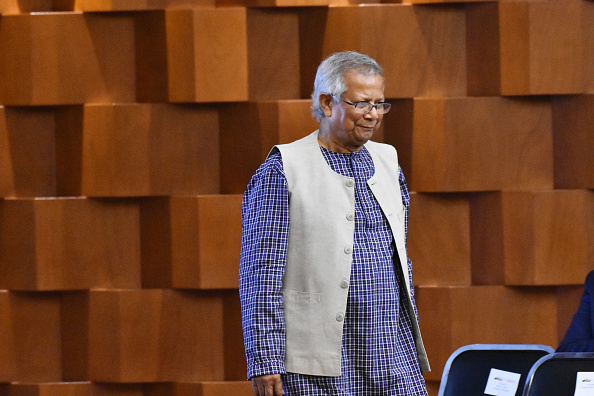Bangladesh is set to get a new, interim government headed by Nobel Peace Prize-winning economist Muhammad Yunus on Thursday, after weeks of tumultuous student protests forced Prime Minister Sheikh Hasina to resign and flee to India.
Yunus, 84, Bangladesh’s only Nobel laureate and a harsh critic of Hasina, was recommended for the job by the student protesters who led the campaign against Hasina.
He was expected to be sworn in as chief adviser along with a team of advisers later on Thursday in an interim government which the army chief said may include 15 members, although discussions on the names continued till late on Wednesday.
Hasina’s Awami League party was not involved in all-party discussions led by army chief General Waker-Uz-Zaman, who announced Hasina’s resignation on Monday.
Her son Sajeeb Wazed Joy said in a Facebook post late on Wednesday that the party had not given up yet and was ready to hold talks with opponents and the administration.
“I had said my family will no longer be involved in politics but the way our party leaders and workers are being attacked, we cannot give up,” Joy said.
Yunus is known as the ‘banker to the poor’ and was awarded the 2006 Nobel Peace Prize for founding a bank that pioneered fighting poverty with small loans to needy borrowers.
He is due to arrive in the capital Dhaka from Paris on Thursday, where he had been receiving medical treatment.
“I’m looking forward to going back home and see what’s happening there and how we can organise ourselves to get out of the trouble that we’re in,” Yunus said before he boarded a flight on Wednesday evening.
Hasina’s dramatic exit on Monday from the country she ruled for four terms – and was reelected to a fifth in January – triggered jubilation and violence across Bangladesh, as crowds stormed and ransacked her official residence unopposed.
She fled to neighbouring India where she is taking shelter at an air base near the capital New Delhi.
Student protestsagainst quotas for government jobs spiralled in July, killing about 300 people and injuring thousands, as demonstrations were met with a violent crackdown that was criticised internationally although the government denied using excessive force.
The protests were fuelled by tough economic conditions and political repression as well.
After years of strong growth as the garment industry expanded, the $450 billion economy struggled with costly imports, inflation and unemployment and the government had sought a bailout from the International Monetary Fund.
Yunus and the Bangladesh Nationalist Party (BNP), Hasina’s main political opponent, called for calm and an end to violence on Wednesday.
“No destruction, revenge or vengeance,” said Hasina’s arch rival and BNP leader Khaleda Zia, 78, in a video address from her hospital bed to hundreds of her supporters at a rally in Dhaka on Wednesday.
Zia, who was released from house arrest on Tuesday, and her exiled son Tarique Rahman, addressed the rally and called for national elections to be held within three months.
On Wednesday, a court overturned Yunus’ conviction in a labour case in which he was handed a six-month jail sentence in January. Yunus had called his prosecution political, part of a campaign by Hasina to quash dissent.
“Let us make the best use of our new victory,” Yunus said.
(Reuters)




















